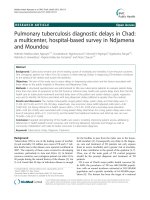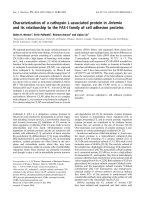Closing the Cancer Divide: A blueprint to expAnd Access in low And middle income countries pdf
Bạn đang xem bản rút gọn của tài liệu. Xem và tải ngay bản đầy đủ của tài liệu tại đây (7.84 MB, 286 trang )
Closing the Cancer Divide:
A BLUEPRINT TO EXPAND ACCESS
IN LOW AND MIDDLE INCOME COUNTRIES
Global Task Force on Expanded Access
to Cancer Care and Control
in Developing Countries
Closing the Cancer Divide:
A Blueprint to Expand Access in Low and Middle Income Countries.
First published, October 2011 by President and Fellows of Harvard College acting
through the Harvard Global Equity Initiative.
Second edition in November 2011.
Copyright © 2011
President and Fellows of Harvard College.
All rights reserved.
SuggeSted citation
Knaul, Felicia Marie, Frenk, Julio and Shulman, Lawrence for the Global Task Force
on Expanded Access to Cancer Care and Control in Developing Countries. Closing the
Cancer Divide: A Blueprint to Expand Access in Low and Middle Income Countries.
Harvard Global Equity Initiative, Boston, MA, November 2011.
*See Table of Contents for authorship of specific sections and text boxes.
This publication is copyrighted. It may be reproduced by any method without fee,
for teaching or non-profit purposes with written permission from the Harvard
Global Equity Initiative (HGEI). Under any other circumstances for copying, reuse
in other publications, or translation or adaptation, prior written permission must be
obtained from the publisher and a fee may apply. An electronic version is available
as a free download from .
Cover Design and Layout: Oliver Gantner and Marycarmen Vázquez, arte
i
diseño.
The views expressed in this publication are those of the GTF.CCC and do not
necessarily represent the views of HGEI or the President and Fellows of Harvard
College. The authors have made every effort to ensure accuracy of the information
within this publication; however, all errors remain our own.
global taSk Force on expanded acceSS to
cancer care and control in developing countrieS
Harvard Global Equity Initiative, Secretariat
651 Huntington Avenue
FXB Building, Room 632
Boston, MA 02115
Email:
table oF contentS
global taSk Force on expanded acceSS to cancer care and control
in developing countrieS
•• Membership
•• Technical Advisory Committee
acknowledgementS
meSSageS From Honorary co-preSidentS
•• HRH Princess Dina Mired
•• Lance Armstrong
ForewordS
•• Claudine Humure
•• Abish Romero Juárez
•• Harvey Fineberg
•• Amartya Sen
preFace
•• Global Task Force on Expanded Access to Cancer Care and Control
in Developing Countries
•• History of the Report
•• Organization of the Report
Part I: MUCH SHOULD BE DONE
Section 1: overview
Felicia Marie Knaul, Paul Farmer
Section 2: tHe global cancer divide: an equity imperative
Felicia Marie Knaul, Héctor Arreola-Ornelas, Hans-Olov Adami, Nancy Keating,
David Hunter, Megan O´Brien, Jim Cleary, Julio Frenk
Text Box 2.1: The cancer transition
Felicia Marie Knaul, Hector Arreola-Ornelas
Text Box 2.2: Cancer care and control in high income countries: elements of progress
David Hunter, Hans-Olov Adami, Felicia Marie Knaul
Anite: A woman in search of care will spend all she has and more
Paul Farmer
Text Box 2.3: Understanding and combating stigma: A LIVESTRONG research
and outreach program
Claire Neal
Section 3: inveSting in cancer care and control
Felicia Marie Knaul, Héctor Arreola-Ornelas, Ramiro Guerrero
Text Box 3.1: The economic benefit of early detection and prevention:
cervical, breast and colorectal cancer
Janice Seinfeld, Arlette Beltrán, Edmundo Morocho
i
iii
v
ix
xv
xvii
xix
xxi
xxiii
xxv
xxviii
xxix
xxxi
xxxiii
xxxiv
xxxv
1
3
33
36
39
44
51
63
70
Part II: MUCH COULD BE DONE
Section 4: HealtH SyStem StrengtHening and cancer:
a diagonal reSponSe to tHe cHallenge oF cHronicity
Julio Frenk, George Alleyne, Rifat Atun, Peter Piot, Felicia Marie Knaul
Text Box 4.1: The diagonal approach
Juanita Part 1: A hypothetical case study of late diagnosis turned into lessons
for implementing a diagonal response
Felicia Marie Knaul, Héctor Arreola-Ornelas, Oscar Méndez
Text Box 4.2: Rwanda: Partners in Health chronic care integration
for endemic non-communicable disease
Julia Lu, Gloria Sangiwa, Agnes Binagwaho
Text Box 4.3: Survivorship
Claire Neal, Felicia Marie Knaul
Section 5: core elementS For proviSion oF cancer care and control in
l
ow and middle income countrieS
Lawrence Shulman, Julie Gralow, Eric Krakauer, Benjamin O Anderson,
Peggy Porter, Mary Gospodarowicz, Sarah Feldman, Carlos Rodríguez-Galindo,
Lindsay Frazier, Leslie Lehmann
Text Box 5.1: Analysis and recommendations around core elements
of a CCC strategy
Text Box 5.2: Jordan: Creating a regional center of excellence for cancer care as
a focus for a national program on cancer care and control
Afsan Bhadelia, Imad Treish, Zaid Bitar, Ruba Anastas, Mahmoud Sarhan
Part III: MUCH CaN BE DONE
Section 6: innovative delivery oF cancer care and control
in low-reSource ScenarioS
Author: Felicia Marie Knaul, Afsan Bhadelia, Julie Gralow, Ana Langer
Text Box 6.1: Optimal tasking: A partial review of literature
Juanita Part 2: Lessons for innovating in delivery
Felicia Marie Knaul, Héctor Arreola-Ornelas, Oscar Méndez
Text Box 6.2: Applications of innovative delivery: Breast cancer
Case 1: PIH-DFCI-BWH Partnership: Innovative Delivery Strategies
for Cancer Care in Rural Rwanda, Malawi and Haiti
Luke Messac, Megan McLaughlin, Kelly Bogaert, Jarred Mcateer, David Shulman,
Amy Sievers and Amy Judd
Case 2: Uganda Program on Cancer and Infectious Diseases:
a collaboration between FHCRC and Uganda Cancer Institute
Corey Casper, Erica Sessle, Warren Phipps, Jessica Yager,
Lawrence Corey, Jackson Orem
77
79
84
86
89
90
97
100
102
125
127
131
132
136
137
139
140
141
142
143
149
159
160
164
175
177
179
186
187
188
189
190
191
Case 3: Expanding access to gynecological CCC in Peru through
an MOH-PATH collaboration
Vivien Tsu
Case 4: Twinning in pediatric oncology: Models for the innovative use
of technology to bridge distance
Felicia Marie Knaul, Afsan Bhadelia, Carlos Rodríguez-Galindo, Lindsay Frazier
Case 5: International training and exchanges: American Society
of Clinical Oncology
Doug Pyle
Case 6: Satellite cancer care in high income countrie
Dana Farber Cancer Institute and Brigham and Wome´s Hospital
Lawrence Shulman
Pediatric Oncology Group of Ontario
Amanda Berger
Section 7: acceSS to aFFordable medicineS, vaccineS, and HealtH tecHnologieS
For cancer: overcoming price and non-price barrierS to acceSS
Jonathan Quick, Niranjan Konduri, Julie Gralow
Text Box 7.1: Working towards affordable pricing for HPV vaccines
for developing countries: the role of GAVI
Aurélia Nguyen, S., Deblina Datta, Nina Schwalbe,
Diane Summers, Geoff Adlide
Text Box 7.2: Partnership and pooled procurement for a life-saving
health technology
Text Box 7.3: Estimating the global unmet need for cancer medicines:
Hodgkin’s lymphoma, cervical cancer, childhood acute
lymphoblastic leukemia, and breast cancer
Ramiro Guerrero, Jaime Andrés Giraldo, Héctor Arreola-Ornelas, Felicia Marie Knaul
Section 8: innovative Financing: local and global opportunitieS
Rifat Atun, Felicia Marie Knaul, Yoko Akachi
Text Box 8.1: Current ODA for NCDs and cancer
Text Box 8.2: Innovative financing along the financing value chain
Case 1: Mexico
Felicia Marie Knaul, Salomón Chertorivski Woldenberg, Héctor Arreola-Ornelas
Case 2: Colombia
Ramiro Guerrero, Ana María Amaris
Case 3: The Dominican Republic
Magdalena Rathe
Case 4: Peru
Janice Seinfeld
Case 5: Taiwan
May Tsung-Mei Cheng
Case 6: China
Jing Ma
Case 7: India
Maja Pleic, Suneeta Krishnan
Case 8: Rwanda
Agnes Binagwaho, Afsan Bhadelia
Section 9: evidence For deciSion-making
Nancy Keating, Felicia Marie Knaul
Text Box 9.1: Leveraging collaboration to establish cancer registries in LMICs:
Examples from Colombia and Uganda
Elena Kouri
Text Box 9.2: Evidence-based approaches to identifying barriers and designing
multifaceted education and intervention projects: Increasing
awareness and enhancing early detection of breast cancer
in Gaza strip
Rola Shaheen
Text Box 9.3: Strengthening collaboration for implementation
and evaluation research
Elena Kouri, Felicia Marie Knaul
Text Box 9.4: International multi-institutional partnerships for capacity-building in
cancer research: Uganda Program on Cancer
and Infectious Disease
Corey Casper
Section 10: StrengtHening StewardSHip and leaderSHip to expand acceSS
to cancer care and control
Felicia Marie Knaul, George Alleyne, Rifat Atun, Julio Frenk, Peter Piot
Text Box 10.1: Stewardship
Text Box 10.2: National cancer plans
Afsan Bhadelia, Kathy Cahill
Text Box 10.3: Mapping national actors: the Jordan case
Afsan Bhadelia, Imad Treish, Zaid Bitar
Text Box 10.4: IARC
Text Box 10.5: Femama: Promoting policy change in Brazil through civil society
Maira Caleffi
Text Box 10.6: The Union for International Cancer Control
Text Box 10.7: ASCO’s evolving engagement in global cancer control
Doug Pyle
Text Box 10.8: Research and publications on cancer in LMICs
Ana Mylena Aguilar
Text Box 10.9: An integrated partnership in Rwanda: Comprehensive National
Cervical Cancer Prevention Program and the Rwanda Task Force
on Expanded Access to Cancer Care and Control
Agnes Binagwaho, Afsan Bhadelia
192
192
199
203
207
209
211
217
219
220
222
225
228
228
230
231
233
Global Task Force
on Expanded Access
to Cancer Care and Control
in Developing Countries
global taSk Force on expanded acceSS
to cancer care and control
in developing countrieS
memberSHip
HONORARY CO-PRESIDENT
Her Royal Highness Princess Dina Mired
Director-General
King Hussein Cancer Foundation
Honorary Chairperson
Jordan Breast Cancer Program
Hashemite Kingdom of Jordan
CO-CHAIRPERSON
Lawrence Shulman, MD
Chief Medical Officer and
Sr. Vice-President Medical Affairs
Dana-Farber Cancer Institute
CO-CHAIRPERSON
Julio Frenk, MD, MPH, PhD
Dean, Harvard School of Public Health
Former Minister of Health, Mexico
SECRETARIAT
Felicia Marie Knaul, MA, PhD
Director, Harvard Global Equity Initiative
Associate Professor of Medicine, Harvard Medical School
Founder, “Tómatelo a Pecho, A.C.”
HONORARY CO-PRESIDENT
Lance Armstrong
Founder
LIVESTRONG
Lance Armstrong Foundation
memberS
Sir George Alleyne, OCC, MD, FRCP, FACP (Hon.), DSc (Hon.)
Director Emeritus, Pan American Health Organization
Chancellor, University of the West Indies
Rifat Atun, MBBS, MRCGP, MBA, DIC, MFPHM
Director, Strategy, Performance and Evaluation Cluster, The Global Fund to Fight AIDS, Tuberculosis and Malaria
Agnes Binagwaho, MD
Minister of Health, Rwanda
Visiting Lecturer on Social Medicine, Harvard Medical School
Douglas Blayney, MD
Ann and John Doerr Medical Director, Stanford Cancer Center
Lincoln C. Chen, MPH, MD
President, China Medical Board
Salomón Chertorivski Woldenberg, MPP
Minister of Health, Mexico
Lawrence Corey, MD
President and Director, Fred Hutchinson Cancer Research Center
Head, Virology Division, Department of Laboratory Medicine, University of Washington
Professor, Medicine and Laboratory Medicine, University of Washington
Paul Farmer, MD, PhD
Kolokotrones University Professor and Chair, Department of Global Health and Social Medicine, Harvard Medical School
Chief, Division of Global Health Equity, Brigham and Women’s Hospital
United Nations Deputy Special Envoy for Haiti
Co-founder, Partners In Health
Sir Richard Feachem, KBE, FREng, DSc(Med), PhD
Director, Global Health Group, University of California, San Francisco
Professor of Global Health, University of California, San Francisco and Berkeley
Former Executive Director, Global Fund to Fight AIDS, Tuberculosis and Malaria
Roger Glass, MD, MPH, PhD
Director, Fogarty International Center, National Institutes of Health
Associate Director for International Research, National Institutes of Health
Mary Gospodarowicz, MD, FRCPC, FRCR
Medical Director, Cancer Program, Princess Margaret Hospital
Professor and Chair, Department of Radiation Oncology, University of Toronto
President-Elect, Union for International Cancer Control
Julie Gralow, MD
Professor, Medicine/Oncology, University of Washington School of Medicine
Associate Member, Fred Hutchinson Cancer Research Center
Director, Breast Medical Oncology, Seattle Cancer Care Alliance
Sanjay Gupta, MD
Chief Medical Correspondent, Health and Medical Unit, CNN
Assistant Professor of Neurosurgery, Emory University School of Medicine
Associate Chief of Neurosurgery, Emory University Hospital and Grady Memorial Hospital
Ana Langer, MD
Coordinator of the Dean’s Special Initiative in Women and Health, Department of Global Health and Population,
Harvard School of Public Health
Former President and Chief Executive Officer, EngenderHealth
Julian Lob-Levyt, MD, MSC
Senior Vice President, DAI
Managing Director of DAI Europe, DAI
Member, International AIDS Vaccine Initiative
Anthony Mbewu, MD
Visiting Professor in Cardiology and Internal Medicine, University of Cape Town
Elizabeth G. Nabel, MD
President, Brigham and Women’s Hospital
Professor of Medicine, Harvard Medical School
Peter Piot, MD, PhD
Director, London School of Hygiene and Tropical Medicine
Former Executive Director, UNAIDS and Under Secretary General of the United Nations
Jonathan D. Quick, MD, MPH
President and Chief Executive Officer, Management Sciences for Health
Department of Global Health and Social Medicine, Harvard Medical School
Olivier Raynaud, MD
Senior Director, Global Health and Healthcare Sector, World Economic Forum
iv
K. Srinath Reddy, MD, DM
President, Public Health Foundation of India
Jeffrey D. Sachs, PhD
Director, Earth Institute, Columbia University
Quetelet Professor of Sustainable Development, and Professor of Health Policy and Management, Columbia University
Special Advisor to United Nations Secretary-General Ban Ki-moon
John R. Seffrin, PhD
Chief Executive Office, American Cancer Society
Jaime Sepúlveda, MD, MPH, DrSc
Executive Director, Global Health Sciences, University of California, San Francisco
George W. Sledge, Jr., MD
President, American Society of Clinical Oncology
Ballvé-Lantero Professor of Oncology, Indiana University
Professor of Medicine and Pathology, Indiana University
Co-director of the Indiana University Simon Cancer Center Breast Program
Secretariat
Harvard global equity initiative
Felicia Marie Knaul, PhD, MA
Director
Afsan Bhadelia, MS
Research Associate
Kathy Cahill, MPH
Senior Advisor
Amanda Berger
Research Assistant
Maja Pleic
Research Assistant
tecHnical adviSory committee
Hans-Olov Adami, MD, PhD
Chair, Department of Epidemiology, Harvard School of Public Health
Professor, Department of Epidemiology, Harvard School of Public Health
Cary Adams, MBA, BSc
Chief Executive Officer, Union for International Cancer Control (UICC)
Clement Adebamowo, BMChB (Hons), FWACS, FACS, ScD
Associate Professor, Department of Epidemiology and Preventive Medicine, School of Medicine, University of Maryland
Associate Professor, Institute of Human Virology, University of Maryland
Director, Office of Strategic Information and Research, Institute of Human Virology, Nigeria
Samia Al-Amoudi, MD
CEO and Founder, Sheikh Mohammed Hussein Al-Amoudi Center of Excellence in Breast Cancer
Chairwoman, Scientific Chair, Breast Cancer Researches
Associate Professor, Consultant and Obstetrician Gynecologist, King Abdulaziz University
v
Benjamin Anderson, MD
Chairman and Director, Breast Health Global Initiative
Joint Member, Division of Public Health Sciences, Fred Hutchinson Cancer Research Center
Professor of Surgery and Joint Professor, Department of Global Health, University of Washington
Director, Breast Health Clinic, Seattle Cancer Care Alliance
Jon Kim Andrus, MD
Lead Technical Advisor, Comprehensive Family Immunization Project, Pan American Health Organization
Professor, Department of Global Health and Director of the Global Health Program, George Washington University
Kate Armstrong, BMed, DCH, MPH
Founder & President, Caring & Living as Neighbours (CLAN)
Chair, NCD Alliance Child-focused Working Group
Héctor Arreola-Ornelas, MSc
Coordinator of Economic Research, Health and Competitiveness, Fundación Mexicana para la Salud
Rashid Bashshur, MS, PhD
Director of Telemedicine, University of Michigan Health System
Professor Emeritus of Health Management and Policy, University of Michigan School of Public Health
Zaid Bitar, BSc
Head, International Development Department, King Hussein Cancer Foundation
Gene Bukhman, MD, PhD
Assistant Professor, Harvard Medical School
Director of Program in Global Noncommunicable Disease and Social Change, Harvard Medical School
Associate Clinical Director, Partners in Health, Rwanda
Senior Technical Advisor on Noncommunicable Diseases, Ministry of Health, Rwanda
Maira Caleffi, MD, PhD
President, Federação de Instituições Filantrópicas de Apoio á Saúde da Mama (FEMAMA)
Corey Casper, MD, MPH
Associate Professor, Medicine, University of Washington
Assistant Member, Program in Infectious Diseases, Clinical Research Division, Fred Hutchinson Cancer Research Center
Assistant Member, Epidemiology, Public Health Sciences Division, Fred Hutchinson Cancer Research Center
Dov Chernichovsky, MA, PhD
Professor, Department of Health Systems Management, Ben-Gurion University of the Negev
Research Associate, National Bureau of Economic Research
Head, Health Team, the Taub Center for the Study of Social Policy, Israel
James F. Cleary, MD
Associate Professor of Medicine (Medical Oncology), University of Wisconsin School of Medicine and Public Health
Director, Palliative Care Service, University of Wisconsin Hospital and Clinics
Director, UW WHO Collaborating Center for Pain Policy and Palliative Care
Téa Collins, MD, MPH
Executive Director, The NCD Alliance
David Cutler, PhD
Otto Eckstein Professor of Applied Economics, Harvard University
Alessandra Durstine, MS, MBA
Vice President for Regional Strategies, International Division, American Cancer Society
Barbara Ferrer, PhD, MPH, MEd
Executive Director, Boston Public Health Commission
Lindsay Frazier, MD, ScM
Attending Physician, Dana Farber Cancer Institute
Associate Professor of Pediatrics, Harvard Medical School
Associate Professor of Epidemiology, Harvard School of Public Health
vi
Emmanuela Gakidou, MSc, PhD
Associate Professor of Global Health, University of Washington
Director, Education and Training, Institute for Health Metrics and Evaluation, University of Washington
Amanda Glassman, MSc
Director of Global Health Policy and Research Fellow, Center for Global Development
Ramiro Guerrero, MSc
Director, PROESA – Centro de Estudios en Protección Social y Economía de la Salud
Susan Higman, PhD, MA
Director, Research & Analysis, Global Health Council
David Hunter, MBBS, MPH, ScD
Dean for Academic Affairs, Harvard School of Public Health
Vincent L. Gregory Professor in Cancer Prevention, Department of Epidemiology and Nutrition,
Harvard School of Public Health
Amy Judd, MS
Director of Program Development, Division of Global Health Equity, Brigham and Women’s Hospital
Nancy Keating, MD, MPH
Associate Professor, Department of Health Care Policy, Harvard Medical School
Associate Physician, Division of General Internal Medicine, Brigham and Women’s Hospital
Niranjan Konduri, MS (Pharm), MPH, CHA
Senior Program Associate, Technical Strategy and Quality, Center for Pharmaceutical Management,
Management Sciences for Health
Constance Lehman, MD, PhD
Professor and Vice Chair of Radiology, University of Washington Medical Center
Section Head of Breast Imaging, University of Washington Medical Center
Director of Imaging, Seattle Cancer Care Alliance
H. Kim Lyerly, MD
George Barth Geller Professor of Research in Cancer
Director, Duke Comprehensive Cancer Center
Ian Magrath, DSc (Med), FRCP, FRCPath
President, Medical & Scientific Director, International Network for Cancer Research and Treatment
Adjunct Professor of Pediatrics, Uniformed Services University of the Health Sciences
Alejandro Mohar, MD, ScD
General Director, National Cancer Institute of Mexico
Claire Neal, MPH, CHES
Senior Director, Lance Armstrong Foundation
Rachel Nugent, PhD
Senior Research Scientist and Associate Professor, Department of Global Health, University of Washington
Alfonso Petersen Farah, MD
Secretary of Health of the State of Jalisco, Mexico
Peggy Porter, MD
Full Member, Division of Human Biology, Fred Hutchinson Cancer Research Center
Co-Head, Women’s Cancer Research Program, Fred Hutchinson Cancer Research Center
Professor, Pathology, University of Washington
Doug Pyle, MBA
Senior Director, International Affairs, American Society of Clinical Oncology
vii
Johanna Ralston, MA, MS
Chief Executive Officer, World Heart Federation
Magdalena Rathe, MA
Executive Director, Fundación Plenitud
Coordinator, Dominican Health Observatory (OSRD)
Coordinator, Network of Health Accounts of the Americas (REDACS)
Anne Reeler, PhD
Chief Technical Officer, Axios International
Raul Ribiero, MD
Member, St. Jude Faculty, St. Jude Children’s Research Hospital
Director, International Outreach Program, St. Jude Children’s Research Hospital
Director, Leukemia / Lymphoma Division, Oncology Department, St. Jude Children’s Research Hospital
Associate Director for Outreach Program, Cancer Center, St. Jude Children’s Research Hospital
Carlos Rodríguez-Galindo, MD
Attending Physician, Dana-Farber Cancer Institute
Medical Director, Pediatric Oncology Clinical Trials, Dana-Farber/Children’s Hospital Cancer Center
Associate Professor of Pediatrics, Harvard Medical School
Isabelle Romieu, MD, MPH, ScD
Head, Section on Nutrition and Metabolism, International Agency for Research on Cancer
Joanna Rubinstein, DDS, PhD
Chief of Staff to Jeffrey Sachs, The Earth Institute, Columbia University
Director of the Center for Global Health and Economic Development, The Earth Institute, Columbia University
María del Rocío Sáenz Madrigal, MPH, MD
Coordinator of Health Policies, Health and Work Program, Central America’s National University
Professor, School of Public Health, University of Costa Rica
Gloria Inés Sánchez, MSc, PhD
Coordinator, Infection and Cancer, University of Antioquia
Associate Professor, Faculty of Medicine, University of Antioquia
Nina Schwalbe, MPH
Managing Director, Global Alliance for Vaccines and Immunization
Rola Shaheen, MD, FRCPC
Chief of Radiology and Director of Women’s Imaging, Harrington Memorial Hospital
Instructor in Radiology, Harvard Medical School
Tatiana Soldak, MD
Director of Programs, The Resource and Policy Exchange
Jeffrey Sturchio, PhD
Senior Partner, Rabin Martin
Former President and CEO, Global Health Council
Vivien Davis Tsu, PhD, MPH
Director, HPV Vaccines Project, PATH
Associate Director, Reproductive Health, PATH
Affiliate Professor, Epidemiology, School of Public Health, University of Washington
Anita K. Wagner, PharmD, MPH, DrPH
Assistant Professor, Department of Population Medicine,
Harvard Medical School and Harvard Pilgrim Health Care Institute
Member, Drug Policy Research Group and WHO Collaborating Center in Pharmaceutical Policy,
Department of Population Medicine, Harvard Medical School and Harvard Pilgrim Health Care Institute
viii
Acknowledgements
GTF.CCC gratefully acknowledges financial and in-kind support received for the preparation of this
Report and for related research from:
Harvard univerSity
lance armStrong FoundationSuSan g. komen For tHe cure©
individual anonymouS donorS
management Science For HealtH
king HuSSein cancer Foundation and center
Seattle cancer care alliance
american cancer Society
cHina medical board
national cancer inStituteS
Fogarty international center
F
undación mexicana para la Salud
g
laxSoSmitHkline
emd Serono
union For international cancer control
HoFFman & HoFFman pr
The GTF.CCC and Secretariat would like to express their sincerest gratitude to collaborators within
Harvard University, including President Drew Faust, Dean Jeffrey S. Flier, Steven Hyman, Barbara J.
Grosz, as well as members of the Harvard Global Equity Initiative (HGEI) Steering Committee including
its Chair Amartya Sen and members Sudhir Anand, Harvey Fineberg, Paula Johnson, Jennifer Leaning
and Tony Saich. Further, we thank the Office of the Provost, including Provost Alan M. Garber, Doreen
Koretz, Patricia Harrington and Radha Suraj, the Department of Global Health and Social Medicine at
the Harvard Medical School, particularly Jennifer S. Puccetti, Debra Keaney and Emily Durrant, the
Francois-Xavier Bagnoud Center, the Dean’s Office at the Harvard School of Public Health (HSPH),
including Linda Brady McDonald, the HSPH Operations Office, including Mary Jane Curran, the Office
of General Counsel, the Connors Center for Women’s Health and Gender Biology and last but not least,
the information technology (IT) departments in HSPH, Harvard Medical School and within Central
Administration.
xi
• American Society of Clinical Oncology
• Avon Foundation
• Axios International
• Beth Israel Deaconess Medical Center
• Ben-Gurion University of the Negev
• Breast Health Global Initiative
• Brigham and Women’s Hospital
• Center for Social Protection and Health
Economic (PROESA)
• China Medical Board
• Clinton Global Initiative
• Cluster on Family, Women’s and Children’s
Health, World Health Organization
• Cluster on Non-Communicable Diseases,
World Health Organization
• Earth Institute, Columbia University
• FEMAMA
• Forum of African First Ladies Against Breast
& Cervical Cancer
• Fred Hutchinson Cancer Research Center
• Fundación Plenitud
• Global Access to Pain Relief Initiative, UICC
• Global Alliance for Vaccines and
Immunization
• The Global Fund to Fight AIDS, TB and
Malaria
• Global Health Council
• Harrington Memorial Hospital
• Harvard University Press
• Institute of Medicine of the National
Academies
• Instituto Jalisciense de Cancerología
• International Agency for Research on Cancer
• International Network for Cancer Research
and Treatment
• International Society of Pediatric Oncology
• Jordan Breast Cancer Program
• London School of Hygiene and Tropical
Medicine
• Ministry of Health of Rwanda
• Medtronic
• Milford Regional Medical Center
• Ministry of Health of Mexico
• Ministry of Health of Rwanda
• Ministry of Health of the State of Jalisco
• Ministry of Heath of the State of Morelos
• Ministry of Health of the State of Nuevo León
• National Institute of Public Health of Mexico
• National Cancer Institute of Mexico
• National Cancer Institute of the US
• National Commission for Social Protection
in Health (Seguro Popular) of Mexico
• NCD Alliance
• PATH
• Pan American Health Organization
• Partners in Health
• Pediatric Oncology Group of Ontario
• Princeton University
• Public Health Foundation of India
• RTI International
• Sheikh Mohammed Hussein Al-Amoudi
Center of Excellence in Breast Cancer
• Stand up to Cancer
• St. Jude’s Children’s Research Hospital, IOP
• The Lancet
• Tómatelo a Pecho, A.C.
• Uganda Cancer Institute
The GTF.CCC expresses its appreciation to the Secretariat staff. The number of people who supported
the development of this report over the course of its writing is too many to list, but to name a few we thank
Amanda Berger, Afsan Bhadelia, Kathy Cahill, Grace Cho, Isabel Davis, Courtney Dickerson, Sophia
Michelen, Gustavo Nigenda and Maja Pleic.
In addition to all authors and contributors as listed in the table of contents, many more were instrumental
in bringing this work to fruition. Numerous patients and many other contributors gave of their time to
help make this Report a reality. The GTF.CCC and Secretariat take this opportunity to specifically list
some of the many individuals and institutions who collaborated and contributed to this Report and to
whom we are indebted for generous support and partnership.
inStitutionS and initiativeS
xii
• Union for International Cancer Control
(UICC)
• Universidad del Pacífico
• University of Washington
• University of Wisconsin School of Medicine
and Public Health
• World Economic Forum
individualS
• Marian Affarah
• Marcella Alsan
• Ala Alwan
• Ana María Amaris
• Islene Araujo de Carvalho
• Martha del Socorro Arias
Novoa
• Larry Bagley
• Emily Bahnsen
• Anna Barker
• Matthew Basilico
• Janine Barnaby
• John Beard
• Sarah Bearse
• Shenieque Bennett
• Vinona Bhatia
• Morgan Binswanger
• Nancy Brinker
• Barri M. Blauvelt
• Kelly Bogaert
• Silvana Bouhlal
• Donna Bowers
• Flavia Bustreo
• Lori Buswell
• Francisco Caballero García
• Victor Manuel Caballero
Solano
• Christopher Cahill
• Miguela Caniza
• Emily Carwell
• Gail Cassell
• Héctor Castro
• Franco Cavalli
• Eduardo Cazap
• Tia Chester
• Lilian Cheung
• Lee Chin
• Shu-Ti Chiou
• Tea Collins
• Michael Constantine
• Gerard Cunningham
• Diana Currea
• Sara Day
• Fausta Debones
• Javier Dorantes
• Elizbeth De Ocampo
• Henry Drew
• Dean Eastwood
• Robin Eisner
• Martha Embrey
• Amy Kate Eussen
• Sophia Faris
• Rebecca Firestone
• James Fitzgerald
• David Forman
• Harold Freeman
• Francis D. Fuller
• Kathryn Galvin
• Pat García-González
• Atul Gawande
• Gary Ginsberg
• Jennifer Goldsmith
• Luz María González
• María Cecilia González
• Chris Gray
• Gregory Harper
• Sarah Hagan
• Mary Hager
• Laurie Hall
• Ana Cecilia Hidalgo
• Susan Higman
• Marshall Hoffman
• Richard Horton
• James Hospedales
• Omar Ishrak
• Salma Jaouni
• Prabhat Jha
• Mercedes Juan López
• Ilana Kadmon
• Hugh Kelleher
• Chelsea Kelley
• Patrick Kelley
• David Kerr
• Heidi Kleedtke
• Eric Krakauer
• Suneeta Krishnan
• Ksenia Koon
• Eric Krakauer
• Garrett Krik
• Richard Laing
• Mary Ann Lane
• Jeremy Lauer
• David Lee
• Daisy Leo
• Ana Ley
• Douglas Lowy
• Leslie Lemann
• Guohong Li
• Tatiana Lingos
• Yuanli Liu
• Amalia Lizárraga
• Silvana Luciani
• Roberto Rivera Luna
• Jing Ma
• Maricela Macías
• Laura Magaña
• Joanne Manrique
• Angela Marmo
• Jaime Andres Giraldo
Marmolejo
• Mario Márquez
xiii
• Sarah Marsh
• Jarred Mcateer
• Miguel Angel Mejía
• Bethany Maylone
• Terri McDonald
• Kathryn McNaught
• Oscar Méndez Carniado
• Fortunate Mendlula
• Vickie Monta
• Andy Miller
• Mary Lisa Miller
• Beth Minnich
• Edmundo Morocho
• Nour Nasif
• Esperance Ndenga
• Fidele Ngabo
• Andrew Norden
• Jason Obedzinski
• Meg O’Brien
• Faith Oliver
• Olufunmilayo Olopade
• Sonia Xochitl Ortega Alanis
• James Ossman
• Sheena Patel
• Erin Pearson
• Sonia Peña
• Mirta Roses Periago
• Gerardo Pérez
• Teresa Pérez
• Alfonso Petersen Farah
• Malebogo Pusoentsi
• Ibrahim Qaddoumi
• You-Lin Qiao
• Yuri Quintana
• Taghreed Rabaa
• Astha Ramaiya
• Jim Rankin
• Scott Ratzan
• Chie Ri
• Herb Riband
• Dee Dee Ricks
• Gaston Rivera
• Elizabeth Reid
• Jospeh Roberts
• Horacio Robles
• Daniel Rodríguez
• Debasish Roychowdhury
• Greg Ruisi
• Joseph Rhatigan
• Julie A. Roberts
• Rusty Robertson
• Francis Saba
• Massoud Samiei
• Jasmine Samuel
• Silvia Sánchez
• Ramon Sánchez Pina
• Mahmoud Sarhan
• Zaina Sarhan
• Peer M. Schatz
• David Scheer
• Ellen Sheets
• Maria Schenider
• Erin Schwartz
• Edna Senato
• Jacqueline Sherris
• Katy Stout
• Ana Shuler
• David Shulman
• Amy Sievers
• Patricia Spellman
• Blaine Smith
• Claudia Smith
• Butch Staley
• Bettina Stevens
• Anna Standertskjold
• Paul Stoffels
• Kathleen Stover
• Sara Stulac
• Jeff Sturchio
• Ana Teasdale
• Christopher Ternan
• Elizabeth Thompson
• Amber Thomson
• Julie Torode
• Vivien Tsu
• Harold Varmus
• Cassia van der Hoof
Holstein
• Jesús Zacarias Villarreal
Pérez
• Ludmila Vite Torres
• Doug Ulman
• Leopoldo Valentín Vargas
• Marcela Vallejo
• Wim Van Damme
• Cassia van der Hoof
Holstein
• George Vélez
• Kim Vitols
• Claire Wagner
• Rebecca Weintraub
• Yelena Wetherill
• Iain Wilson
• Hyun Ju Wooh
• Christopher Wild
• Eric Winer
• Scott Wittet
• Kevin Wnek
• Miri Ziv
• Jerome Zeldis
xiv
Messages from
Honorary Co-President
W
hen I was first asked to be the Honorary Co-President of the Global Task Force
for Expanded Access to Cancer Care and Control in Developing Countries (GTF.
CCC) two years ago, I immediately accepted, because beyond the long and prestigious
title and the ambitious goals, this Task Force struck a deep chord. Every item the GTF.
CCC sought to address, we had experienced or were experiencing at the King Hussein
Cancer Foundation and Center in Jordan. Whether it was the high cost of drugs or the
access to care, we faced it. Whether it was the use of telemedicine or doable solutions
within constraints, we faced it. These challenges were all extremely real to us, and remain
real to us today as we continue to provide international quality cancer care in a resource-
poor, middle income country and in a region where many countries still do not have
access to quality cancer care.
What is unique about the GTF.CCC is that it applies a two pronged approach:
First, the idealist prong which pushes for best practices in global funding and sustainable
international support for cancer – similar to the support afforded to AIDS, Malaria and
TB. And second, the realistic prong which recognizes the limitations on the ground
and works despite them, through them and around them to reach its objectives. One
of the many examples of this is Rwanda where, rather than leave a patient untreated,
chemotherapy was safely prepared, administered and monitored despite the lack of
an on-site oncologist, but with backup from off-site specialists internationally through
coordination between the Government of Rwanda and Partners in Health. This is a
concrete example of how collaboration and international partnerships are at the core
of achieving any success against cancer.
Cancer, a disease plagued by stigma and discrimination within many communities,
itself displays no discrimination in how it targets its victims. It affects everyone, all
ages and all races. However, today, with approximately two-thirds of the annual cancer
mortality worldwide in low and middle income countries (LMICs), it is clear that the
burden of the disease is disproportionately faced by the poor who either have no access
to cancer care at all or cannot afford the exorbitant costs associated with such catas-
trophic illnesses.
I witnessed this harsh inequity and disparity between the developed and developing
world in a very personal way when, just two days shy of his second birthday, my son
was diagnosed with leukemia. Rather than the joys of celebration, we faced a cancer
diagnosis and the paralyzing fear that we could lose what is most precious. Fortunately,
I was one of the privileged few able to travel the distance necessary to provide my son
with life-saving treatment at Dana Farber, one of the best cancer centers in the United
States. Others are not so lucky.
The reality of leukemia cure rates is sadly reflective of the inequity in care; children
with leukemia in the developed world have a 90% chance of a cure, while 90% of their
counterparts in the world’s 25 poorest countries will die. While cancer patients in the
developed world are asking “Where will I be treated?” their counterparts in the developing
world are asking “Will I be treated?” I firmly believe that it remains every individual’s
right to receive the best possible treatment – regardless of where they live.
• • •
xvii









